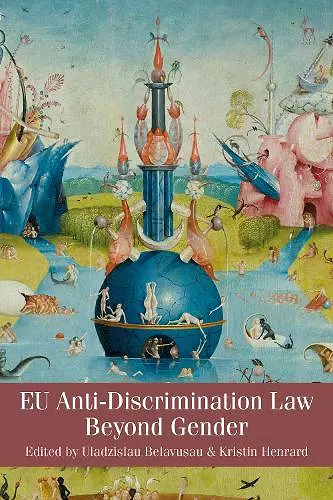EU Anti-Discrimination Law Beyond Gender
Kristin Henrard editor Uladzislau Belavusau editor
Format:Hardback
Publisher:Bloomsbury Publishing PLC
Published:15th Nov '18
Should be back in stock very soon

This collection offers a critical retrospective on the development of equality law in the European Union.
The EU has slowly but surely developed a solid body of equality law that prohibits different facets of discrimination. While the Union had initially developed anti-discrimination norms that served only the commercial rationale of the common market, focusing on nationality (of a Member State) and gender as protected grounds, the Treaty of Amsterdam (1997) supplied five additional prohibited grounds of discrimination to the EU legislative palette, in line with a much broader egalitarian rationale. In 2000, two EU Equality Directives followed, one focusing on race and ethnic origin, the other covering the remaining four grounds introduced by the Treaty of Amsterdam, namely religion, sexual orientation, disabilities and age.
Eighteen years after the adoption of the watershed Equality Directives, it seems timely to dedicate a book to their limits and prospects, to look at the progress made, and to revisit the rise of EU anti-discrimination law beyond gender. This volume sets out to capture the striking developments and shortcomings that have taken place in the interpretation of relevant EU secondary law. Firstly, the book unfolds an up-to-date systematic reappraisal of the five ‘newer’ grounds of discrimination, which have so far received mostly fragmented coverage. Secondly, and more generally, the volume captures how and to what extent the Equality Directives have enabled or, at times, prevented the Court of Justice of the European Union from developing even broader and more refined anti-discrimination jurisprudence. Thus, the book offers a glimpse into the past, present and – it is hoped – future of EU anti-discrimination law as, despite all the flaws in the Union’s ‘Garden of Earthly Delights’, it offers one of the highest standards of protection in comparative anti-discrimination law.
The book is a hugely valuable contribution to the existing literature on EU anti-discrimination law and an outstanding piece of scholarly work, providing thought-provoking insights to the way in which the principle of equality applies to race and ethnicity, religion, sexual orientation, age and disability. -- Koen Lenaerts, President of the Court of Justice of the European Union
For anyone interested in a critical assessment of how EU anti-discrimination law has developed for members of minority groups (religious, ethnic, racial, sexual-identity, others) this is now the place to start, with accessible, readable, thought-provoking chapters by leading and up-and-coming scholars in the field. -- David B. Oppenheimer, Professor of Law at UC Berkeley Law School
This volume goes to the heart of one of the most dynamic and fascinating fields of EU law. We are faced with an excellent contribution, which will be the reference book on EU discrimination law in the years to come, of great benefit to academics, officials, practitioners, judges and anyone interested in anti-discrimination policies in general. -- Allan Rosas, Judge at the Court of Justice of the European Union
This book is a very special kind of garden guide. It compares today's EU anti-discrimination law with a Garden of Equal Delights. The reason for this, the editors explain, is that despite all its flaws, the EU offers one of the highest standards of protection in comparative anti-discrimination law. Whilst this is true, discrimination is a factually complex field of EU law, and understanding and navigating it is helped immensely by the kind of guide provided by this book. -- Christa Tobler, Professor of European Law at the Universities of Basel (Switzerland) and Leiden (the Netherlands)
EU anti-discrimination law is a mixture of significant leaps forward and missed opportunities, which is fairly true for secondary law and decisions of the European Court of Justice. Along these lines, the book edited by Uladzislau Belavusau and Kristin Henrard is a remarkable academic contribution to the development of EU anti-discrimination law beyond gender by diagnosing legal challenges and potential solutions. -- Tamás Gyulavári * European Labour Law Journal *
Overall, this is a much-welcomed book that brings systematic analysis to the existing EU anti-discrimination law literature and offers remarkable reflections on the achievements of the 2000 Equality Directives, and their shortcomings and avenues, to introduce further improvements in this field. -- Sara Benedi Lahuerta, University of Southampton * European Law Review *
The contributors to the book, well-known experts in the field and upcoming scholars, paint a picture of EU equality law that highlights its aspirational nature, its diversity as well as its sometimes detectable disorganization. They do so in a convincing, comprehensive and thought-provoking manner ... a detailed, carefully researched analysis, which will certainly influence future debates. Moreover, it is a creative contribution to the field of EU equality law. -- Johanna Croon-Gestefeld * Common Market Law Review *
[N]o other recent publication can rival EU Anti-Discrimination Law beyond Gender in terms of diversity and the importance of perspectives. The well thought through structure of this anthology, the excellent choice of authors, and the clear message on the potential ways of empowering the concept and tools of EU law make the book extremely important reading for scholars, practising lawyers, experts and NGO activists. -- Aleksandra Gliszczynska-Grabias * International and Comparative Law Quarterly *
For [its] focus, as well as for the range and quality of its chapters, the book makes an important contribution to the literature on EU's anti-discrimination law. -- Barbara Havelková * Modern Law Review *
ISBN: 9781509915019
Dimensions: 236mm x 158mm x 28mm
Weight: 740g
392 pages